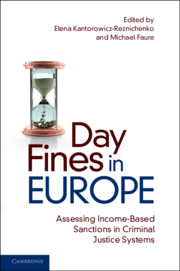Book contents
- Day Fines in Europe
- Day Fines in Europe
- Copyright page
- Contents
- Figures
- Tables
- Contributors
- Acknowledgements
- Abbreviations
- 1 Introduction
- 2 Theoretical Perspectives on Day Fines
- 3 Day Fines in Finland
- 4 Day Fines in Sweden
- 5 Day Fines in Denmark
- 6 Day Fines in Germany
- 7 Day Fines in Austria
- 8 Day Fines in Hungary
- 9 Day Fines in France
- 10 Day Fines in Portugal
- 11 Day (Unit) Fines in England and Wales
- 12 Day Fines in Slovenia
- 13 Day Fines in Spain
- 14 Day Fines in Poland
- 15 Day Fines in Croatia
- 16 Day Fines in Switzerland
- 17 Day Fines in Czech Republic
- 18 Day Fines in Romania
- 19 Comparative Law and Economics Perspective on Day Fines
- Index
- References
10 - Day Fines in Portugal
Published online by Cambridge University Press: 11 June 2021
- Day Fines in Europe
- Day Fines in Europe
- Copyright page
- Contents
- Figures
- Tables
- Contributors
- Acknowledgements
- Abbreviations
- 1 Introduction
- 2 Theoretical Perspectives on Day Fines
- 3 Day Fines in Finland
- 4 Day Fines in Sweden
- 5 Day Fines in Denmark
- 6 Day Fines in Germany
- 7 Day Fines in Austria
- 8 Day Fines in Hungary
- 9 Day Fines in France
- 10 Day Fines in Portugal
- 11 Day (Unit) Fines in England and Wales
- 12 Day Fines in Slovenia
- 13 Day Fines in Spain
- 14 Day Fines in Poland
- 15 Day Fines in Croatia
- 16 Day Fines in Switzerland
- 17 Day Fines in Czech Republic
- 18 Day Fines in Romania
- 19 Comparative Law and Economics Perspective on Day Fines
- Index
- References
Summary
The present chapter focuses on the day fine model in Portugal. Based on an analysis of the historical development, the legal framework, the practical implementation and the public perception of the Portuguese day fines system, as well as of its constitutionality challenges, we conclude that, for the past two decades and although several other alternatives to imprisonment can be imposed, the day fine became the most frequently applied criminal sanction in Portugal, both as a primary and a substitutive penalty. We argue, however, that, in spite of the legal fairness of the adopted day fines regime and of the general level of acceptance of the day fine among the Portuguese courts and academic literature, the day fine has prima facie a retributive quality and, because of its maximum limits, hasn’t proved preventively adequate in the most economically lucrative offences (financial, environmental or political criminality), related to the offender’s cost-benefit equation. Furthermore, the subsidiary liability of corporate leaders for the fines imposed on legal persons raises difficult constitutionality issues.
Keywords
- Type
- Chapter
- Information
- Day Fines in EuropeAssessing Income-Based Sanctions in Criminal Justice Systems, pp. 181 - 194Publisher: Cambridge University PressPrint publication year: 2021
References
References
Case Law
Decision of the Constitutional Court 61/2006, www.tribunalconstitucional.pt
Decision of the Constitutional Court 249/2012, www.tribunalconstitucional.pt
Decision of the Constitutional Court 171/2014, www.tribunalconstitucional.pt
Decision of the Supreme Court of Justice to Standardize Case Law 8/2013, www.dgsi.pt
Decision of the Supreme Court of Justice to Standardize Case Law 12/2013, www.dgsi.pt
Decision of the Supreme Court to Justice to Standardize Case Law 13/2013, www.dgsi.pt
Decision of the Supreme Court of Justice to Standardize Case Law 7/2016, www.dgsi.pt

